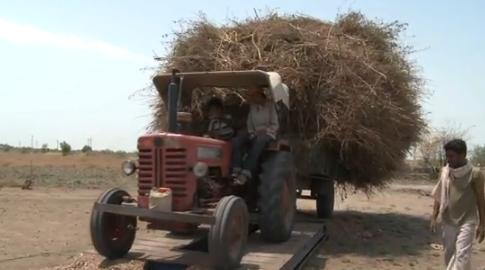Gujarat’s cotton farmers: Saving energy and making money with ‘useless’ crop waste
Cotton farmers in the Indian state of Gujarat are supplementing their incomes – and helping the environment – by selling once-worthless crop by-products as fuel. A local energy company has

Cotton farmers in the Indian state of Gujarat are supplementing their incomes – and helping the environment – by selling once-worthless crop by-products as fuel.
A local energy company has found a novel way to turn the leftovers into small pellets which are then sold as a cheap replacement for coal. “These pellets have a positive social, economic and environmental impact,” says Abellon CleanEnergy Limited.
Pankaj Patel, president of Abellon, says most cotton farmers in the Gujarat region (which is one of the world’s largest cotton growing regions) used to simply burn the debris or let it break down on their land. The volume of by-products is relatively high in the cotton industry, which means hundreds of tonnes of material is burnt in the open air during harvesting season.
Unhealthy smoke
“The farmers need to get rid of it. They burn it in open fields, which results in unhealthy smoke and fumes. That’s not good for humans or animals who live in the region. It’s a big health and environmental problem, but most people thought it was inevitable as there’s not much you can do with the residue.”
This problem led to Abellon’s idea to turn the residue into pellets.
“We found that burning the residue produces a lot of energy, even more than coal does. It just burns better. So it’s very attractive for industries that need a lot of energy in their production process. They don’t even have to modify their energy burning systems.”
Abellon collects the cotton biomass in the many villages in the Gujarat region, where it’s shredded into small pieces. From there it’s transported to a regional processing plant where the biomass is treated and cut into small pellets. These are sold to the industry as fuel.
Local level
“We specifically operate on a small, local level,” says Mr Patel. “Our people approach the farmers in their village, on the crossroads in the village centre. There we display the price we’re paying. The farmers bring their crop residue and we pay them money – it’s as simple as that.”
Abellon’s local representatives work in small zones. “No farmer has to travel more than five kilometers to bring their material,” says Mr Patel. “If they have to travel ten kilometers or more, they simply can’t be bothered. You have to make it a little easy for them to cooperate.”
Watch a video on this project here.
Benefits
Most farmers are happy to cooperate, especially since the money is relatively good. But Mr Patel admits that the ecological benefits may be a little less important to them.
“Most of these farmers don’t know much about global warming. But they do know about local pollution. They know what it’s like if you burn this residue in the open air and what it does to the air quality. Many people suffered from respiratory illnesses.”
With that in mind, it didn’t take much for Abellon to convince the farmers to collect the residue rather than burning it.
Expand
Abellon now operates ten local collection centres, which gather the by-products for two plants. In all, it employs over 200 people.
“Currently we produce 65,000 tonnes of pellets every year. But we’d like to expand to the rest of India and possibly abroad as well. We expect to produce 500,000 tonnes of pellets in a few years time.”
The ecological benefits are big: burning one tonne of biomass pellets instead of the same volume of coal saves 1.7 tonnes of carbon dioxide. With the current annual production level of 65,000 tonnes of pellets, Abellon saves approximately 110,000 tonnes of carbon dioxide per year.
Award
Recently, Abellon was awarded the prestigious Ashden Award for Sustainable Energy, for achieving such a high reduction of carbon dioxide in the region.
“As a company, we focus on carbon dioxide reduction and on doing something good for the local economy. And if our work also means that farmers make a bit of money out of material that used to be rendered useless, than that’s a nice side benefit. But to us, the ecological benefits are our prime concern.”
This story made me
- 97
- 121
- 89
- 167










